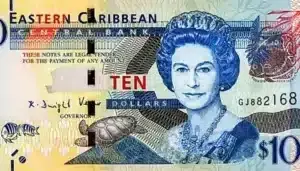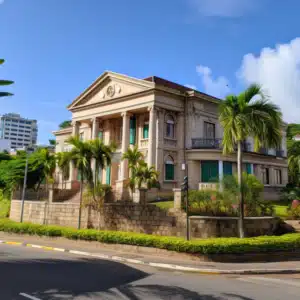This article will detail the list of banks in Grenada as well as other relevant information like setting up an account.
Grenada has 18 banks, of which 3 are renowned. Including microfinance institutions, the remaining 15 hardly qualify as trustworthy.
Banks give internet banking access, service both individuals and corporate clients, and open accounts remotely. The monthly average cost of maintenance for settlement accounts is 5 US dollars.
If you are looking to invest as an expat or high-net-worth individual, which is what I specialize in, you can email me (advice@adamfayed.com) or WhatsApp (+44-7393-450-837).
We recommend that most wealthy locals and expats consider offshore investment despite this list, and we can help with that.
List of Banks in Grenada: Eligibility for Setting Up a Bank Account
Banks in Grenada provide services to locals, foreigners, and residents under a variety of conditions. Non-residents must present extra documentation when opening an account and must specify which operations they will have access to. These will all be based on the banks’ policies and license.
Banks in Grenada accept customers from both individuals and businesses. Current, checking, savings, and foreign currency accounts can be opened by individuals. Meanwhile, accounts for settlement, current, checking, saving, and foreign currency can be opened by legal businesses.
Required Documents to Open an Account
Three primary documents must be provided by each individual:
- A paperwork for personal identification, such as a driver’s license, ID card, resident card, NIS card, or social security card issued to a Grenada resident, among other documents. In some circumstances, two of these documents are needed.
- A statement attesting to the applicant’s registered residence. Recent utility bills are okay.
- A statement of income verification. A salary certificate or employment contract may be enclosed by employees, however a bank account statement for the previous year must be enclosed by business owners and self-employed individuals.
The bank may further seek the following details:
- A letter of recommendation from a financial institution with which the applicant is already affiliated. When the candidate opened their account with the bank should be mentioned in the letter, along with a statement from the bank expressing satisfaction with how the customer has handled their account. It’s usually crucial that the bank account has been active for at least two years.
- Applicants who are non-residents are typically asked for their taxpayer identification number or TIN.
The following records are required of legal entities:
- Papers proving the existence of the company, such as the charter or memorandum of association, the registration certificate, and a Certificate of Good Standing or its equivalent. The company’s compliance with all legal obligations is attested to in this document. The country’s trade registry, where the company is registered, issues it.
- Proof of the shareholder structure and board of directors. It is also possible to ask for certificates attesting to the election of the board of directors, the company secretary, the composition of the shareholders, the company register, and the resolution authorizing the issuance of shares.
- A set of paperwork for individuals, such as a passport and utility bills that reveal the company’s beneficiary. A personal account statement, tax return, pay stub, salary certificate, or dividend check from another company can all be used to verify information on the beneficiary’s income. If the beneficiary is not a shareholder, a Declaration of Trust in the beneficiary’s favor from the shareholder(s) must be submitted.
- An account manager’s power of attorney confirming their right to open and manage accounts on the business’ behalf.
Each bank has a different set of required paperwork and different forms that must be completed. Any copy of an original document mailed to the bank must be translated into English, apostilled, and notarized in order to be accepted.
When compared to locals and citizens, foreigners are typically required to provide more documentation by Grenada’s banks. To authenticate the amount of income, for instance, as well as to declare all sources of revenue, may be necessary. You can apply to become a citizen of Grenada to make using the banking system within this nation simpler.

Financial Services Offered by Grenadian Banks
Banks in Grenada have adapted to the increasing international interest in the island’s banking sector, which has helped propel Grenada’s GDP over $1.26 billion USD in 2022. This growth reflects the island’s appeal as an investment destination and the banking sector’s commitment to offering modern solutions alongside traditional financial services.
Comprehensive List of Services
- Savings, Checking, and Current Accounts: Banks in Grenada offer these fundamental accounts for managing funds with security and accessibility.
- Lending Solutions: This includes personal loans, mortgages, and business financing, supporting various financial goals.
- Investment Services: Banks in Grenada provide services like portfolio management, wealth planning, and access to local and international investment opportunities.
- Electronic Banking: Online and mobile banking services are available for convenient account management and transactions.
- Foreign Exchange and International Transactions: Assistance with currency exchange and handling international transactions is a key service.
- Credit and Debit Cards: These are issued for convenient payments and withdrawals.
- Safe Deposit Boxes: Valuable items and documents can be securely stored.
- Business Banking: Tailored services for business accounts, financial management, and loans are available.
- International Banking: This includes facilitating offshore banking needs.
- Financial Advice and Mentorship: Expert guidance on financial planning and investment strategies is provided.
Opening a Bank Account in Grenada
Step-by-Step Process: The process for opening a bank account in Grenada involves choosing a bank, checking bank fees, gathering necessary documents, visiting the bank, meeting with a representative, filling out an application form, submitting documents, reviewing the agreement, making an initial deposit, and finally activating the account.
Documents and Requirements
- Individuals: Requirements typically include a passport or ID, a utility bill for proof of residence, and an income statement. Additional documents like a letter from another bank may be requested.
- Legal Entities: Required documents include a certificate of company registration, company charter, certificate of good standing, and details regarding directors and shareholders.
Recent Developments
Co-op Bank’s Expansion: Recently, Grenada Co-operative Bank Limited announced its plan to acquire the banking operations of CIBC FirstCaribbean in Dominica, Grenada, St. Kitts and Nevis, and St. Vincent and the Grenadines.
This significant development marks an evolution in Grenada’s banking system, promising enhanced value creation in the Grenada economy.
Regulatory Compliance and KYC Policies
Compliance and Security: Banks in Grenada are known for their strict adherence to Know Your Customer (KYC) and Anti-Money Laundering (AML) policies.
This commitment ensures the integrity of banking services and positions Grenadian banks as trustworthy institutions for both local and international clients.
Understanding Grenada’s Banking Regulations and Compliance
Overview of Grenada’s Regulatory Framework
Grenada’s approach to banking regulations and compliance is multi-faceted, involving a range of entities like the Financial Intelligence Unit (FIU), the Ministry of Finance, and the Grenada Authority for the Regulation of Financial Institutions (GARFIN).
These entities are responsible for overseeing and enforcing the regulatory framework that governs banks in Grenada. This framework includes laws and regulations aimed at combating money laundering and terrorism financing.
Key Regulations and Compliance Measures
Anti-Money Laundering (AML) and Counter-Terrorism Financing (CTF)
Banks in Grenada adhere to stringent AML and CTF measures. The country has enacted various laws like the Money Laundering Prevention Act, the Proceeds of Crime Act, and the Financial Intelligence Unit Act, reflecting its commitment to international standards.
These laws require banks to perform due diligence, monitor transactions, and report suspicious activities.
Consumer Protection and Financial Transparency
Consumer protection is another critical aspect of Grenada’s banking regulation. Banks in Grenada are expected to provide clear and accurate information to customers, ensuring transparency in all banking operations. This includes clear communication of fees, charges, and terms of services.
Grenada’s Compliance with International Standards
FATF Recommendations and Mutual Evaluations
Grenada actively participates in the Caribbean Financial Action Task Force (CFATF) and adheres to the Financial Action Task Force (FATF) recommendations.
These international standards guide Grenada’s policies and procedures related to AML and CTF. The country undergoes regular mutual evaluations to assess its compliance with these standards.
Challenges and Progress
While Grenada has made significant strides in improving its banking regulations and compliance systems, challenges remain, particularly in aligning with evolving international standards and dealing with the dynamic nature of financial crimes.
Despite these challenges, banks in Grenada have demonstrated a cooperative nature in tackling these issues, a factor that is crucial for the continuous improvement of the sector.
The Role of Banks in Regulatory Compliance
Banks in Grenada play a crucial role in the overall effectiveness of the country’s regulatory framework.
They are not only responsible for adhering to laws and regulations but also for actively participating in the nation’s efforts to combat financial crimes. This involves ongoing training, internal controls, and collaboration with regulatory authorities.
How to Get a Citizenship in Grenada
You can become a citizen of Grenada within six months. To accomplish this, you must make economic investments in the nation. Investors have two choices: the second investment can be refunded after five years, whereas the first is final.
A Grenada passport is also given to the investor’s spouse, children under 30, siblings older than 18, parents, and grandparents. The cost of the citizenship program rises when family members are listed on the application.
Grenada nationals are not required to obtain visas to enter any of the 144 Schengen nations, including Great Britain, China, Singapore, and others. You need a visa to enter the USA, but you may apply for an E-2 business visa with a validity of five years. You can also get a tourist visa right away, which is valid for 10 years.
Investors can open a bank account quickly and without the need for extra documentation by selecting any organization from the list of banks in Grenada.
Grenadians pay no taxes on their worldwide income, salaries, capital gains, inheritance and gifts.
List of Banks in Grenada
All financial operations of the Eastern Caribbean Currency Union are governed by the Eastern Caribbean Central Bank. Maintaining the stability of the Eastern Caribbean dollar, the region’s shared currency, is its primary objective.
Banks Operated in Grenada
- ACB Grenada bank
- CIBC Bank
- RBC bank
- Bank of Asia
- FirstCaribbean International bank
- BancorpSouth bank
- Development bank
- Fincor bank
- Grenada Co-operative bank
- Regions Bank
- Renasant Bank
- Woodforest bank
- Republic Bank (Grenada)
Three banks in Grenada are members of the Caribbean Association of Banks, a group of the most reputable financial organizations: Republic Bank (Grenada), Grenada Co-operative Bank, as well as ACB Grenada Bank.
The FirstCaribbean International Bank, a sizable bank in Barbados, has two branches in Grenada as well. 16 Caribbean nations now have bank branches open.
The operations of Scotiabank and Republic Bank (Grenada) Ltd., the Group’s existing affiliate in Grenada, were combined in 2021.
Grenada offers banking services to people and businesses from other nations as well. However, it typically takes longer for non-residents to obtain a bank account.
The Grenada citizenship by investment program provides the chance to obtain a second passport and take use of all the perks, such as visa-free travel, tax efficiency, and banking services.
List of Banks in Grenada: Currency
The East Caribbean dollar (denoted by EC$ or XCD) serves as the main currency in Grenada and five other Caribbean nations. The holders of such accounts face no currency risk because the East Caribbean dollar is tied to the US dollar and is always equivalent to 37 US cents.
By default, accounts are opened in East Caribbean dollar. There are also foreign currency accounts accessible in Canadian, US, British, and European currencies.

The Role of Banking in Grenada’s Economy
Economic Resilience and Diversification
Banks in Grenada play a pivotal role in the island’s economic resilience and diversification. Grenada has been focusing on policy and institutional measures to maintain fiscal discipline and transition its economy towards a sustainable, well-governed blue growth model.
This transition involves a balanced use of ocean resources, which is crucial for a small island nation. Efforts include enhancing transparency and accountability in the state-owned enterprise sector and improving efficiency in customs procedures.
These measures contribute to a stable economic environment, which is fundamental for the functioning of banks in Grenada.
Impact of COVID-19 and Recovery
The COVID-19 pandemic had a significant impact on Grenada’s economy, causing an economic contraction and rising unemployment.
However, the banking sector remained well-capitalized, showcasing its resilience. Despite the challenges, the medium-term outlook for Grenada’s economy is cautiously optimistic. This optimism is reflected in the banks in Grenada, which play a crucial role in economic recovery and stability.
Future Growth and Development
The International Monetary Fund (IMF) predicts that Grenada’s economy will continue to grow robustly and is expected to surpass its pre-pandemic level in 2023.
This growth is driven by the strength in construction and an increase in tourist arrivals, among other factors.

The Citizenship-by-Investment (CBI) program also contributes significantly to this growth, supporting both public and private investments. Banks in Grenada are instrumental in facilitating these developments, providing the necessary financial services and support.
Fiscal Reforms and Financial Sector Stability
Grenada is advancing an ambitious fiscal reform agenda, including the new Fiscal Resilience Act, which simplifies the existing fiscal rules framework and enhances the role of the Fiscal Resilience Oversight Committee.
This act aims to guide longer-term fiscal discipline, reflecting positively on the stability of banks in Grenada. Furthermore, the financial sector remains stable and liquid, with bank credit growth increasing, especially for construction and consumer goods loans.
Banking Services and Accessibility
Banks in Grenada offer a range of online and mobile banking services, making banking more accessible to the population. Service fees and commissions are in place for various banking services, ensuring the economic viability of these institutions.
Opening a bank account in Grenada is a straightforward process, catering to both individuals and legal entities. This ease of access to banking services is a testament to the robustness of banks in Grenada.
List of Banks in Grenada: Online banking
You can obtain an account statement, make money transfers between accounts, and pay utility bills using mobile or internet banking. Additionally, it is possible to ask for an overseas transfer, which the bank representative will handle within one business day.
No matter the time of day or the location of your bank, you may manage your business activities online at any time.
You must prepare the necessary bundle of documents in advance, provide them to the bank employee working with you, and complete an application for opening an account in order to open an account in person at the branch. When your application is accepted, you must go back to the bank to sign up for their online banking service, make a deposit, and, if necessary, get a bank card.
The initial application must be made online on the bank’s website in order to open an account remotely. A representative via proxy may be used to transfer the necessary bundle of documents and signed contract rather than by mail. You can sign up for the bank’s online banking service if your application is granted.
The bank gives the application up to two weeks of consideration, then an account is opened for the applicant once the application is approved. Although there is no fee to start an account, there may be circumstances where a particular sum of money needs to be deposited right away. In some cases the amount can be as much as 10,000 US dollars.
All bank customers have access to online banking at no cost. You may check your account balance, see a history of your transactions, get a statement, transfer money between accounts, and pay utility bills online. However, using the app will not allow you to transfer funds to another bank account or start a new account.

Digital Banking and Technological Innovations in Grenadian Banks
The Evolution of Digital Banking in Grenada
Grenada’s banking sector is actively embracing digital transformation, reflecting a broader trend across the Caribbean. While the pace of digital banking growth in the region may not be as rapid as in Latin America, there are significant strides being made.
One notable example from the wider Caribbean context is WiPay, a Trinidad and Tobago-founded company offering digital payment solutions. It emphasizes the regional shift towards innovative digital banking services, which Grenada is also part of.
Online and Mobile Banking Services in Grenada
The core of Grenada’s digital banking revolution lies in the expansion of online and mobile banking services. Major banks in Grenada, such as the Grenada Co-operative Bank and Republic Bank, offer comprehensive online banking and mobile banking options.
These services provide convenience and flexibility, allowing customers to manage their finances efficiently and securely from anywhere.
Enhancing Customer Experience through Digital Platforms
Digital banking in Grenada not only offers basic banking services but also aims at enhancing customer experience.
The shift towards digital platforms means that customers can expect a more streamlined and user-friendly banking experience. This transformation is crucial for banks to stay competitive and meet the evolving needs of their customers.
The Impact of Digital Transformation on Banking Efficiency
Banks in Grenada are harnessing digital technologies to improve operational efficiency. This includes everything from the processing of transactions to customer service delivery.
The pandemic has accelerated this shift, prompting banks to offer more services digitally, thereby reducing the need for physical interactions and improving overall efficiency.
The Role of Technology and Innovation Hubs
Supporting the digital banking transformation, Grenada is also exploring the establishment of technology and innovation hubs. These hubs aim to foster innovation, create new opportunities, and enhance the skills and capacity of local talent.
They serve as incubators for new ideas and technologies, potentially playing a significant role in further advancing digital banking solutions in Grenada.
Future Prospects of Digital Banking in Grenada
As Grenada continues to develop its digital banking infrastructure, the future looks promising. With the potential for more fintech partnerships and the emergence of new digital banking startups, banks in Grenada are well-positioned to offer more inclusive and efficient access to banking services.
This evolution is crucial for meeting the growing demand for digital banking solutions and ensuring the banking sector’s resilience and sustainability.
Sustainable Banking Practices in Grenada
Republic Bank’s Commitment to Sustainability
Republic Bank Grenada, a prominent player among banks in Grenada, has taken significant steps towards reducing its carbon footprint.
One notable initiative includes transitioning from electricity generated from natural gas to a photovoltaic (PV) solar system at their corporate headquarters.
This change represents a shift towards renewable energy sources, significantly reducing the bank’s annual carbon emissions.

Moreover, Republic Bank Grenada’s parent company, Republic Financial Holdings Limited, became a signatory of the United Nations Principles for Responsible Banking in October 2020.
This agreement aligns the banking industry with the objectives of the UN Sustainable Development Goals and the 2015 Paris Climate Agreement, highlighting the bank’s commitment to shaping a sustainable future.
Republic Bank’s Sustainable Projects
Republic Bank Grenada, as part of Republic Financial Holdings Limited, aims to make impactful contributions towards sustainability, focusing on areas such as poverty reduction, education, gender equality, climate action, sustainable agriculture, and the blue economy.
Their commitment to these areas signifies a comprehensive approach to sustainability, going beyond mere financial transactions.
Grenada’s Transition to a Blue Economy
Grenada’s banking sector, including banks in Grenada like Republic Bank, plays a pivotal role in supporting the country’s transition to a resilient blue economy.
The World Bank has approved a US$20 million credit to support this transition, fostering reforms for fiscal sustainability, strengthening marine and coastal management, and building climate resilience.
The initiative underscores the importance of sustainable and well-governed use of ocean resources, essential for the country’s economic diversification and environmental preservation.
This move also supports the government’s measures for better environmental and natural resource management, including integrated coastal zone management and the inclusion of environmental sustainability requirements in public procurement.
Policy Measures and Environmental Impact
Key policy measures in this initiative include the ban on Styrofoam food containers and the phase-out of single-use plastic shopping bags and disposable utensils.
Such policies address the critical environmental challenge of plastic pollution, which threatens ocean biodiversity and the development of tourism, a significant contributor to Grenada’s GDP.
List of Banks in Grenada: The Bottom Line
There surely must be a bank in Grenada that can fit your needs whether as an investor or as an individual. Just be sure to check more thoroughly before setting up an account. You can talk to different bank representatives to know more of what services they can provide you with, as well as get an idea of not only the pros but also the potential cons of opening a bank account with them and doing your transactions.
Pained by financial indecision? Want to invest with Adam?

Adam is an internationally recognised author on financial matters with over 830million answer views on Quora, a widely sold book on Amazon, and a contributor on Forbes.



